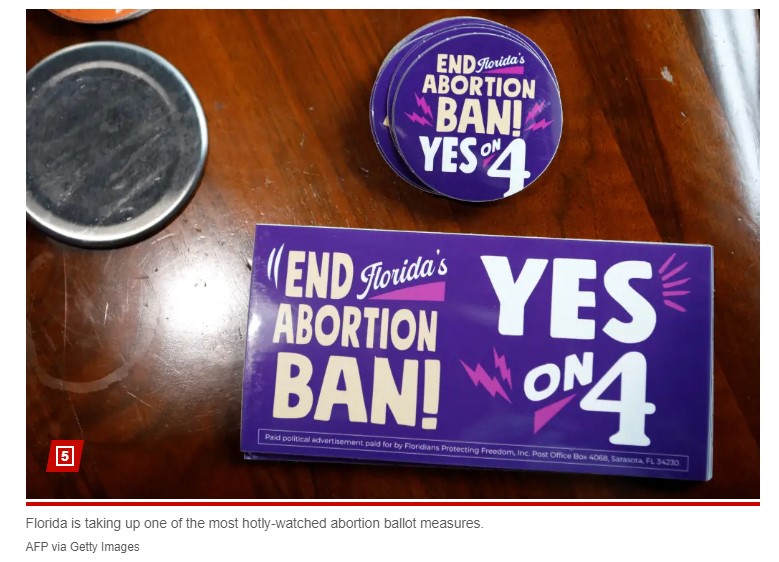
Pro-Life group warns of ‘Trojan horse’ ballot measures to boost abortion across the country
By: Ryan King, originally published October 28, 2024, New York Post
A preeminent anti-abortion organization is sounding the alarm over provisions in ballot measures that could enshrine abortions up until birth in some states.
“Current pro-abortion lawfare proves state abortion ballot measures are Trojan horses for overturning pro-parent, pro-life laws,” Susan B. Anthony Pro-Life America (SBA) warned in a recent memo.
“Advocates use abortion amendments to challenge parental rights and force taxpayer-funded, all-trimester abortion through litigation,” the group added. “They are quickly building legal precedent through such lawfare that will allow them to use state constitutional amendments to do away with commonsense state laws and enact policies that go well beyond ‘restoring Roe.’ ”
At least 10 states have ballot measures related to abortion up for consideration on Nov. 5 — including conservative-leaning Arizona, Florida, Montana, Missouri, Nebraska and South Dakota as well as blue states like Colorado, Maryland and New York.
While many of the referenda are billed simply as a means of restoring abortion rights first established by the Supreme Court in Roe v. Wade more than 50 years ago, SBA argued that the proposals use open-ended language that could go beyond the 1973 decision.
“Unfortunately, the broad, often undefined language in these amendments opens the door to judicial interpretation far different than what voters expected based on ballot summaries, media coverage, and even the text itself,” the group added.

The most high-profile referendum is Amendment 4 in Florida, which would permit abortions up until so-called fetal viability — usually defined as 24 weeks. That initiative must receive 60% of the vote to prevail.
In its memo, SBA cited Ohio, where voters green-lit a constitutional amendment in 2023 enshrining the right to an abortion while allowing the state to implement restrictions after fetal viability. It noted that an ACLU of Ohio attorney suggested that parental consent laws for minors who obtain abortions may not comply with that amendment.
In a recent lawsuit, pro-abortion rights organizations such as Planned Parenthood also challenged the Buckeye State’s requirements for informed consent and in-person consultation with a licensed physician before undergoing the procedure.

Ultimately, the court mostly sided with pro-abortion rights organizations and enjoined the Ohio amendment.
In Michigan, voters approved an amendment to enshrine a “state constitutional right to reproductive freedom” back in 2022. A top official at the ACLU in that state recently groused that the regulation “singles out and excludes people who are Medicaid-eligible from this right,” raising the possibility that state taxpayers could be made to pay for the procedure under a future expansion of the entitlement.
Also in Michigan, an abortion rights group fought against laws mandating women have a 24-hour reflection period and give informed consent prior to terminating their pregnancy. In June, a court once again largely sided with the pro-choice side.
“Two additional cases in Ohio and Michigan seek to block critical safeguards on dangerous chemical abortion drugs, as well as to force taxpayers to fund elective-late-term abortions. Both rely on the states’ recently passed abortion amendments as ground[s] for invalidating these state laws,” SBA further warned.
The group’s memo comes as many Republicans find themselves on the back foot over abortion, with polls showing the public sides with Democrats more on the issue.
Back in April, former President Donald Trump announced that he would not enact a federal abortion ban and intended to leave the matter to the states.
Later, the Republican Party overhauled its campaign platform to remove language calling for national abortion restrictions.
Following a series of ballot setbacks, some political observers have questioned the long-term viability of the anti-abortion movement, just two years after notching its greatest victory with the overturn of Roe.
Leadership at several prominent anti-abortion organizations have fretted about being outflanked and outspent by pro-abortion rights groups during election cycles.
SBA stressed that with Election Day fast approaching and ballots already being cast, anti-abortion groups need to do a better job educating voters on the topic.
“As Ohio and Michigan prove,” it said, “passing ‘right to abortion’ constitutional amendments have allowed new judicial interpretations that overrule decades-long policies protecting women, minors, and conscientious taxpayers, leaving states exposed to the full radicalism of the pro-abortion Left.”
Ryan King is an author and journalist for the New York Post.
